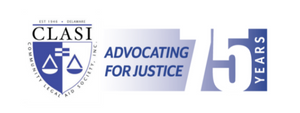FOR IMMEDIATE RELEASE: May 4, 2023
FOR FURTHER INFORMATION:
Laura Waterland, Esq.
Project Director, CLASI Disabilities Law Program
302-476-8509 / lwaterland@declasi.org
New Report from CLASI Disabilities Law Program Finds Widespread ADA Accessibility Violations at Delaware’s Polling Places
WILMINGTON, DE—Ahead of Delaware’s upcoming School Board Elections on May 9, the Disabilities Law Program (“DLP”) of Community Legal Aid Society, Inc. (“CLASI”) has today issued a new report finding persistent, widespread accessibility violations at the state’s polling places. The DLP is calling on the Department of Elections to meet its obligations under the Americans with Disabilities Act (“ADA”) and ensure that all Delaware polling places are accessible to voters with disabilities going forward.
The new report finds significant problems with inaccessible parking at Delaware polling places—nearly a third (30%) of the 145 polling places surveyed by the DLP lacked accessible parking spaces for cars and/or vans, either because they were completely absent or because spaces marked as accessible did not comply with ADA standards. The report also reveals problems with inaccessible routes from parking areas and inaccessible building entrances, including issues with non-compliant ramps, thresholds, doorways, and door handles, at between 3% and 18% of the polling places surveyed.
Access to the franchise is one of the most fundamental and important rights of American citizens and must be accessible to all eligible voters. Nevertheless, Delaware voters with disabilities continue to face barriers that suppress that right, in violation of the ADA. While advances in technology have yielded significant improvements in the accessibility of voting equipment, today’s DLP report shows that the same cannot be said for an often-overlooked issue: the physical accessibility of polling places.
“Year after year, we have reported the same issues and many of the same polling places to the Department of Elections, yet the problems persist,” said DLP Project Director Laura Waterland, Esq. “We are calling on the Department to make election accessibility a priority in the coming year so that all Delawareans can exercise their fundamental right to vote, including those with disabilities.”
“Delaware has invested millions in new voting machines to improve accessibility, but that’s of no help to voters with disabilities if they can’t park at a polling place and safely make their way to an accessible entrance to actually use the machine,” said Joann Kingsley, DLP Voting Rights Advocate. “The Department must take meaningful steps to include the disability community in its planning and training activities, and we would welcome the opportunity to provide any technical assistance and support necessary.”
As the Governor’s designated Protection and Advocacy agency for the state of Delaware, the DLP is charged with advocating for the legal rights of residents with physical or mental disabilities through its offices in Wilmington, Dover, and Georgetown. The Protection and Advocacy for Voting Access (“PAVA”) project within the DLP works to ensure full and effective participation in the electoral process for individuals with disabilities. Each year, DLP monitors polling places across Delaware to ensure compliance with the ADA and other state and federal laws designed to protect the rights of persons with disabilities.
On November 8, 2022, the DLP poll monitoring team assessed 145 of the 275 polling places across Delaware. The team included DLP staff and volunteers from the University of Delaware’s Access:Ability Scholars Program and Widener Delaware Law School who are trained on ADA accessibility standards. On Election Day, the monitors took measurements and entered their findings into an online survey tool developed by the DLP, based on the ADA Checklist for Polling Places for election officials. The survey tool guided the poll monitors from the parking entrance to the parking spaces, along the accessible exterior pathway, to the building entrance, and then to the interior pathway and voting area inside the building.
Many of the accessibility shortfalls identified in the DLP’s report are not difficult to resolve, but they have not been sufficiently prioritized or funded. The identification and remediation of barriers to access will require more training, greater awareness and more responsiveness by Delaware’s election officials and poll workers. Governmental authorities also need to commit to ensuring accessibility by providing election officials with the resources they require to implement solutions.
The DLP also strongly encourages the Department of Elections to take steps to integrate the disability community in its planning, messaging, and public outreach activities—indeed, with all aspects of voting. Greater inclusion of the disability community in decisions and processes affecting their lives is necessary, important, and long overdue.
View the DLP report here: PAVA Delaware General Election Accessibility Report – May 2023
About the Disabilities Law Program of Community Legal Aid Society, Inc.:
Founded in 1946, the mission of Community Legal Aid Society, Inc. (“CLASI”) is to combat injustice through creative and persistent civil legal advocacy on behalf of vulnerable and underserved Delawareans. CLASI provides free legal representation to people with disabilities, people aged 60 or over, people with low incomes, and victims of crime and discrimination to help our clients obtain shelter, government benefits, educational services, medical services, orders of protection from abuse, legal immigration status, and other civil legal remedies.
CLASI’s Disabilities Law Program (“DLP”) provides free legal representation to children and adults with physical and mental disabilities to protect them from abuse and neglect and to advocate for their legal rights in the community. The DLP serves as Delaware’s designated Protection and Advocacy system for people with disabilities (“P&A”). Learn more about the DLP here: https://www.declasi.org/disabilities-law-program/
CLASI has offices in Wilmington, Dover, and Georgetown. To learn more about our work, please visit: https://www.declasi.org/

